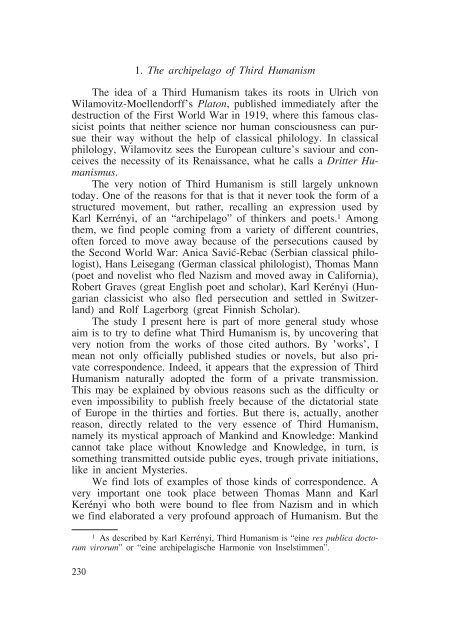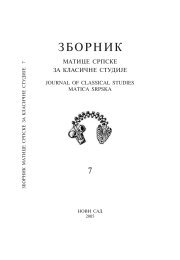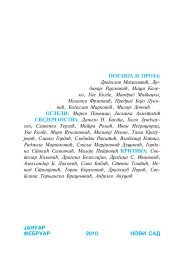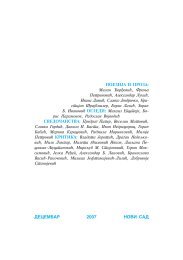You also want an ePaper? Increase the reach of your titles
YUMPU automatically turns print PDFs into web optimized ePapers that Google loves.
1. The archipelago of Third Humanism<br />
The idea of a Third Humanism takes its roots in Ulrich von<br />
Wilamovitz-Moellendorff's Platon, published immediately after the<br />
destruction of the First World War in 1919, where this famous classicist<br />
points that neither science nor human consciousness can pursue<br />
their way without the help of classical philology. In classical<br />
philology, Wilamovitz sees the European culture's saviour and conceives<br />
the necessity of its Renaissance, what he calls a Dritter Humanismus.<br />
The very notion of Third Humanism is still largely unknown<br />
today. One of the reasons for that is that it never took the form of a<br />
structured movement, but rather, recalling an expression used by<br />
Karl Kerrényi, of an “archipelago" of thinkers and poets. 1 Among<br />
them, we find people coming from a variety of different countries,<br />
often forced to move away because of the persecutions caused by<br />
the Second World War: Anica Saviã-Rebac (Serbian classical philologist),<br />
Hans Leisegang (German classical philologist), Thomas Mann<br />
(poet and novelist who fled Nazism and moved away in California),<br />
Robert Graves (great English poet and scholar), Karl Kerényi (Hungarian<br />
classicist who also fled persecution and settled in Switzerland)<br />
and Rolf Lagerborg (great Finnish Scholar).<br />
The study I present here is part of more general study whose<br />
aim is to try to define what Third Humanism is, by uncovering that<br />
very notion from the works of those cited authors. By 'works', I<br />
mean not only officially published studies or novels, but also private<br />
correspondence. Indeed, it appears that the expression of Third<br />
Humanism naturally adopted the form of a private transmission.<br />
This may be explained by obvious reasons such as the difficulty or<br />
even impossibility to publish freely because of the dictatorial state<br />
of Europe in the thirties and forties. But there is, actually, another<br />
reason, directly related to the very essence of Third Humanism,<br />
namely its mystical approach of Mankind and Knowledge: Mankind<br />
cannot take place without Knowledge and Knowledge, in turn, is<br />
something transmitted outside public eyes, trough private initiations,<br />
like in ancient Mysteries.<br />
We find lots of examples of those kinds of correspondence. A<br />
very important one took place between Thomas Mann and Karl<br />
Kerényi who both were bound to flee from Nazism and in which<br />
we find elaborated a very profound approach of Humanism. But the<br />
1 As described by Karl Kerrényi, Third Humanism is “eine res publica doctorum<br />
virorum" or “eine archipelagische Harmonie von Inselstimmen".<br />
230

















